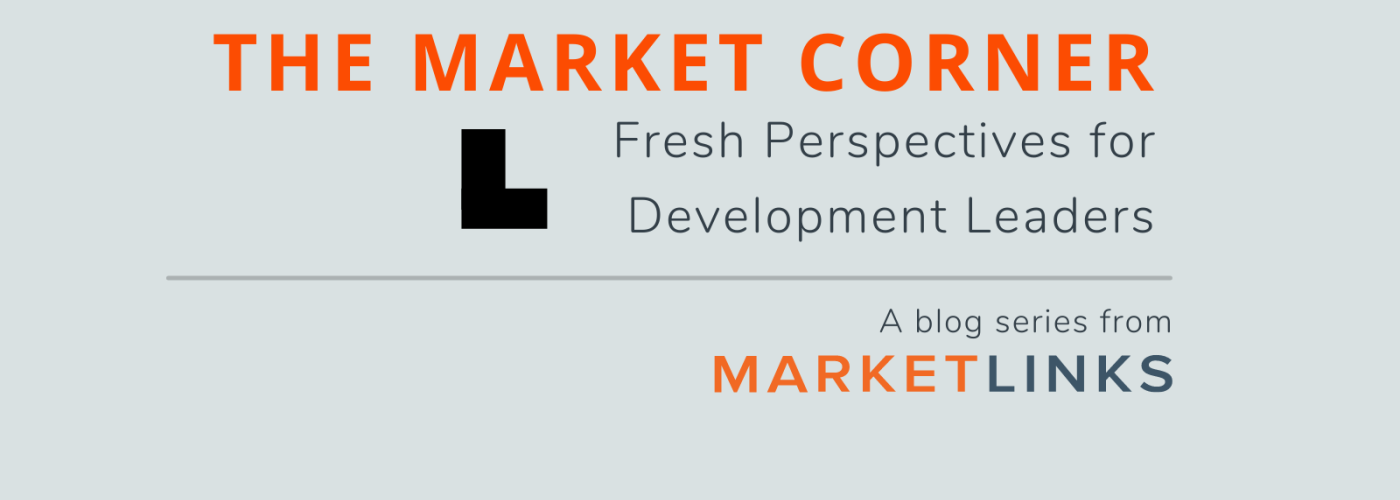The Market Corner: Overcoming Obstacles to Greater Uptake of Deep Impact Investing Approaches
Image

In April’s second installment, the Market Corner continues its conversation with Sana Kapadia from Gender Smart Investing and Rory Moses, Independent Consultant most recently with the G7 Impact Taskforce and previously Associate Director at Palladium Impact Capital, about the obstacles to greater uptake of deep impact investing approaches like Justice, Equity, Diversity, and Inclusion (JEDI) and systems change investing despite their growing demand (see this month’s first installment for more details).
Track record is everything and the burden of proof remains (unfairly) high.
It is unsurprising that numbers speak in the finance world. However, Sana and Rory have both experienced how the industry’s thirst for numbers and evidence can be difficult to quench and, importantly, get in the way of more systemic change.
“The finance industry is built on track record. Track record is everything.” – Rory
Initiatives like GenderSmart and the wider field of gender finance have produced evidence and made the gender lens investing and JEDI case for more than two decades, but the requests to “prove the [JEDI] business case” remain. Sana finds this finite thinking limiting and points out that “No one is asking for proof that homogenous white male teams and boards are good for business.”
Addressing global systemic inequalities requires, among other things, developing investment ecosystems in emerging markets. In Rory’s experience, however, the implicit “track record” requirement for fund managers makes this objective hard to achieve. According to Rory, “Almost no one is going to invest in a first-time fund manager in an emerging market.” This means there is no bridge to build out capabilities in these markets and therefore a constrained pipeline of funds for investment, further restricting the development of the ecosystem. In the absence of proven local talent, the outdated fly-in, fly-out investor model is therefore perpetuated, as are more traditional views on investing. Fortunately, there are initiatives like the Due Diligence 2.0 commitment that are trying to shift these investment processes and norms — but they face an uphill battle.
Investors can be overwhelmed by impact measurement.
Some investors feel overwhelmed with the myriad ways impact can and needs to be assessed. For example, it was difficult to find agreed upon criteria to classify gender lens investments until the publication of the 2X Challenge Criteria (2X). This straightforward set of criteria for gender lens investing has helped accelerate more investment in women-owned/led businesses, as well as other forms of impact investing. In the gender lens investing community, despite progress, questions around measuring impact and related depth and rigor remain. And, as the field matures and more actors are thinking about the intersection of gender and themes like climate, financial inclusion, and many more, this process of impact measurement and management is getting more layered and more complex.
While 2X has been a game-changer for the finance industry, it is important to expand the criteria for investment approaches with a systems lens, so as to support more systemic approaches. For example, Rory pointed out that Net Zero Investing has attracted a lot of attention (and capital) recently, but some, including Rory, criticize the approach for overlooking the importance of social justice in mitigating climate change impacts. Fortunately, Rory and Sana pointed out that there are several, more holistic approaches including Just Transition Investing, Systems Level Investing, and Equity Impact Investing that are gaining traction among investors and other actors in the finance ecosystem.
Better impact measurement and incentive models are needed to advance impact investing approaches.
The financial industry is very good at aligning financial incentives. There are tried and true methods to financially incentivize managers (e.g., hurdle rate, fees, and upside splits/carry). Setting impact incentives, however, is equally if not more important, but is harder to accomplish. Methodologies and criteria, for example, are still being refined, and the cost of collecting, attributing, and evaluating impact remains high.
Both Rory and Sana agreed that data collection for impact measurement is an area that needs improvement for the industry but referenced 60 Decibels as a pioneer in this challenging field. The 2X criteria is also harmonized across IRIS+, Hippo, and UN Women's Economic Empowerment Principles. In Rory’s Systems Change Investing work, he finds that “it is a constant struggle for investors and management teams to figure out exactly how lean the data can be,” often finding himself in debates about the minimum viable product in terms of impact collection. Despite the challenge, he believes it is critically important to find the right balance between rigor and depth, taking into consideration the existing resource constraints on companies and the heavy burden of data collection and reporting. This data is needed to assess impact, learn from areas of underperformance, and inform future investment decisions by identifying opportunity sets.
Fear of talking about failure.
“No one wants to look as if they are not doing well enough,” says Sana. Rory echoed this by commenting that, “The reason that few people talk about failures in the finance industry is because track record is everything.” Moreover, he pointed out that the industry’s penchant for privacy, in general, does not encourage sharing of information and learning. The GenderSmart community and other such spaces are about fostering forums to have this open, solutions-oriented dialogue and enhance collective capacity, commitment, and action. The impact investing side tends to be more open and collaborative, especially when encouraged by influential impact investors (e.g., Rockefeller Foundation, Open Society Foundation, etc.) who have the power to ensure that they mandate private equity funds to provide data. Carrots and sticks from powerful investors are encouraging some funds to move outside of their comfort zone and share information and lessons learned more freely, but Rory believes industry-wide transparency will only come as a result of regulatory change.
“I think we need to continue having more honest direct conversations about what good and what better looks like.” - Sana Kapadia
For Sana, open and honest conversations are just as much about talking about failures as they are about doubling down on authenticity and bringing our whole selves to meetings and forums. In the forums she is part of, this is about creating the right spaces for these dialogues and leveraging Chatham House Rules which permit participants to spotlight information from the meeting but not reveal the identity or affiliation of the speaker or participants unless express consent is provided.
We need to be more ambitious.
Improving impact measurement and incentive models will undoubtedly advance impact investing approaches. But Rory believes that it is necessary to go further and enshrine investor commitments, especially those that already operate in the ESG and impact investing space to deep impact approaches, such as Systems Change and or JEDI in their mandate.
“The ways in which investments are thought about and implemented will change dramatically as soon as leaders of big institutional investors and other investors (e.g., DFIs, Foundations, etc.) start looking at this from a holistic point of view, instead of thinking that they just need to meet these five Net Zero targets by 2050.” - Rory Moses
Applying this line of thought to future generations of finance leaders, Sana posited the question, “What if we start teaching the sustainable development goals at school? If we teach our children about investment beyond just financial returns, maybe the next generation of bankers will be thinking more holistically about investment returns in terms of how this investment is helping to catalyze community engagement and development.”
What if we lived in a world where environmental and social justice returns were as, if not more, important than financial returns? Considering where we are and the power structures and underlying biases which govern the financial sector, it seems almost impossible to imagine. However, the momentum behind such investment approaches like Systems Change and JEDI suggest that this world is within our grasp, especially if we begin to deepen our understanding of these approaches and confront the very issues — such as the fear of talking about failure, challenges with measuring impact, and reliance on track record — holding the sector back.
Do you have examples of novel deep impact investing approaches? Post via your Marketlinks account, or send them to us at info@marketlinks.org.

Holly Lard Krueger is a managing partner at the Canopy Lab and a market systems development expert with over 15 years of experience providing technical advice in the field of private sector development/engagement with a specific focus on applying digital technology, gender equality and social inclusion (GESI), market systems, and Value for Money (VfM) principles to project and strategy design for agriculture, humanitarian aid, business enabling environment reform, trade, urban development, and women’s economic empowerment programs.
Holly is a proven strategic leader, having managed large market systems projects with diverse teams. She is also skilled as a strategic advisor, coach, and trainer in the practical application of systems approaches to market development, and she is currently an advisor to USAID’s Bureau for Humanitarian Assistance, a World Bank-funded program in West Africa (TFWA), a DFAT-funded program in Indonesia (PRISMA), and a FCDO-funded program in the Democratic Republic of the Congo (Essor). Holly is based in Morocco and has worked in over 15 countries in Africa, Asia, and the Middle East and has implemented projects and conducted evaluations for leading donors, including the Bill & Melinda Gates Foundation, DFAT, IFC, FCDO, USAID, and the World Bank. She has an M.A. from Johns Hopkins School of Advanced International Studies and a B.A. from Vanderbilt University.
Image

Rory Moses is an impact-focused investment advisor, specializing in private, emerging market, impact investment funds with experience across vehicle types and sectors, and a particular interest in climate vehicles with a focus on just transition. He is currently an independent consultant who most recently co-authored G7 Impact Taskforce report on mobilizing institutional capital towards the SDGs and a Just Transition. He also spent the last four years in impact investment banking as an Associate Director at Palladium Impact Capital (formerly Enclude Capital). He was previously a management consultant focused on growth strategies for financial institutions in Southern Africa. He has studied in South Africa, Germany, and the United Kingdom.
Image

Sana Kapadia is Head of Content at GenderSmart, where she develops programming for the global gender finance community. She leads the Justice, Equity, Diversity, and Inclusion Working Group and a Care Economy initiative. A gender-smart investing specialist and global changemaker, her career has spanned development finance, impact investing, and equity research. She has grown a social impact accelerator, advises on and implements effective blended finance solutions, and provides capacity building and advisory support around impact ecosystem building and embedding gender lens frameworks.

